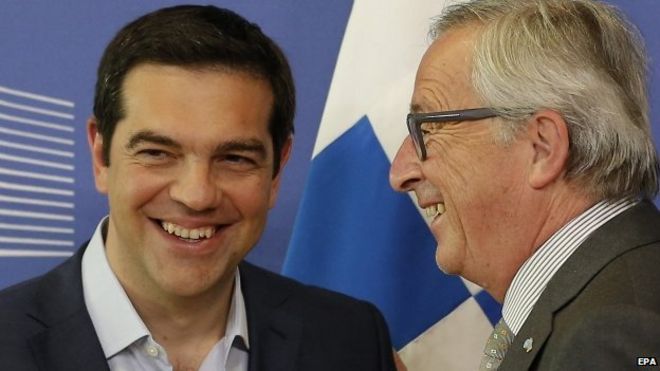Greece has told the International Monetary Fund it will delay Friday's €300m (£216m) debt repayment and bundle all four of its June payments together.

The Athens government will have until 30 June to pay the €1.5bn total, which is also the day on which its bailout deal with the EU and IMF runs out.
Prime Minister Alexis Tsipras is trying to reach a deal to unlock final bailout funds before Greece runs out of money.
But Greece's creditors say differences remain between the two sides.
IMF spokesman Gerry Rice said that under a precedent dating back to the late 1970s, governments could ask to bundle together "multiple principal payments falling due in a calendar month... to address the administrative difficulty of making multiple payments in a short period."
The last country to bundle together payments to the IMF was Zambia in the mid-1980s.
BBC economics correspondent Andrew Walker says the €300m payment would have been difficult for the Greek government but reports suggest it had identified money that could have been used.
The decision to delay it may also be a negotiating tactic, he adds, intended to put pressure on the IMF and the EU in negotiations over the bailout.
Mr Tsipras said after talks in Brussels in the early hours of Thursday that an agreement with Greece's international creditors was "in sight".
However, the head of the eurozone's finance ministers Jeroen Dijsselbloem, who was involved in the negotiations, said later the gap was "still quite large".
High-level talks were expected to resume on Friday, although Mr Tsipras was due to brief the Greek parliament rather than return to Brussels.
'In sight'
Mr Tsipras rejected elements of proposals put forward by his country's international creditors in talks with Mr Dijsselbloem and European Commission chief Jean-Claude Juncker.
He said the sides were now "very close to an agreement" on the key sticking point of primary surpluses - the amount by which tax revenues exceed public spending.

But he said there were "points that no-one would consider as a base for discussion", citing cuts to pensions and a raise in sales tax for electricity.
Mr Dijsselbloem said the talks had been successful in narrowing down the remaining issues, although key differences still remained.
He expected Greece to "look at our proposals more carefully, probably come up with some alternative proposals that they want," Reuters quoted him as saying.

Greece debt talks - main sticking points
- International creditors want pension cuts, slimmer civil service, VAT reform, fewer tax rebates and more private sector investment, reports say
- Mr Tsipras rules out increased VAT on energy and reduced supplementary payments for poorer pensioners
- Athens wants lower primary budget surplus targets, but both sides appear close to agreement. According to reports, creditors want a budget surplus of 1% of GDP this year and 2% next, while Greece has proposed 0.8% for 2015 and 1.5% for 2016

Greece in numbers
€320bn
Greece's debt mountain
€240bn
European bailout
- €56bn Greece owes Germany
- 177% country's debt-to-GDP ratio
- 25% fall in GDP since 2010
- 26% Greek unemployment rate
Reuters
Greece's cash-strapped government has been haggling since February over the release of the last €7.2bn in funds, but its current bailout arrangement with the IMF, European Central Bank (ECB) and European Commission runs out at the end of June.
Failure to reach a deal could trigger a Greek default and a potential exit from the eurozone.
Speaking to the BBC on Thursday, German Chancellor Angela Merkel said: "We want Greece to stay in the euro but in order to achieve that, Greece has to make the necessary efforts, and these are the subject of our ongoing discussions, and I want to see them come to a positive result."



No comments:
Post a Comment